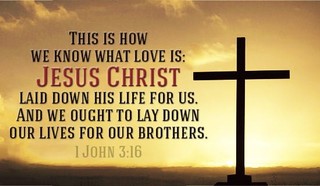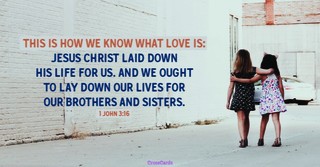- Recent Translations
- All Translations
1 John 3:14
Share
Settings
1 John 3:14 Meaning and Commentary
We know that we have passed from death to life
From a death in sin, a moral or spiritual death; which lies in a separation from God, Father, Son, and Spirit; in an alienation from the life of God; in a loss of the image of God, of righteousness, holiness, and knowledge, in which man was created; in a privation of all true sense of sin, and in a servitude to it, which is unto death, and is no other than death: and from a legal death, or death in a legal sense, under the sentence of which all men are, as considered in Adam; and which God's elect are sensible of, when convinced by the Spirit of God, and are in their own apprehension as dead men. Now in regeneration, which is a quickening of sinners dead in sin, a resurrection of them from the dead, the people of God pass from this death of sin, and the law, to a life of sanctification, having principles of grace and life implanted in them; and to a life of justification, and of faith on Christ, as the Lord their righteousness; and to a life of communion with Christ; and to such a life as is to the glory of Christ; and to a right to eternal life. And this passing from the one to the other is not of themselves, it is not their own act; no man can quicken himself, or raise himself from the dead; in this men are passive: and so the words are rendered in the Vulgate Latin, Syriac, and Arabic versions, "we know that we are translated"; that is, by God the Father, who delivers from the power of darkness, and death, and translates into the kingdom of his dear Son, which is a state of light and life; or by Christ, who is the resurrection and the life, who is the author of the resurrection from the death of sin to a life of grace; or by the Spirit of life from Christ, by whom souls are quickened, and of whom they are born again: and this passage from death to life, or regeneration, is a thing that may be, and is known by the regenerate man; who, as he knows surely, that whereas he was blind he now sees, so that whereas he was dead in sin, he is now alive; and among other things it may be known by this,
because we love the brethren:
this is not the cause of passing from death to life, but the effect of it, and so an evidence of it, or that by which it is known; brotherly love being what the saints are taught of God in regeneration, and is a fruit of the Spirit of God, and is what true faith works by, and is what shows itself as soon as anything in a regenerate man; nor can anyone love the saints, as such, as brethren in Christ, unless he is born again; a man may indeed love a saint, as a natural relative, as a good neighbour, and because he has done him some good offices, and because of some excellent qualities in him, as a man of learning, sense, candour, civility though he has not the grace of God; but to love him as a child of God, a member of Christ, and because he has his image stamped on him, no man can do this, unless he has received the grace of God; so that this is a certain evidence of it:
he that loveth not [his] brother, abideth in death;
in the death of sin, in a state of nature and unregeneracy; under the sentence of condemnation and death; and he is liable to eternal death, which is the wages of sin, under the power of which such a manifestly is. This is said to deter from hatred, as also what follows.
1 John 3:14 In-Context
Footnotes 1
- [a] Lit. 'the.'

